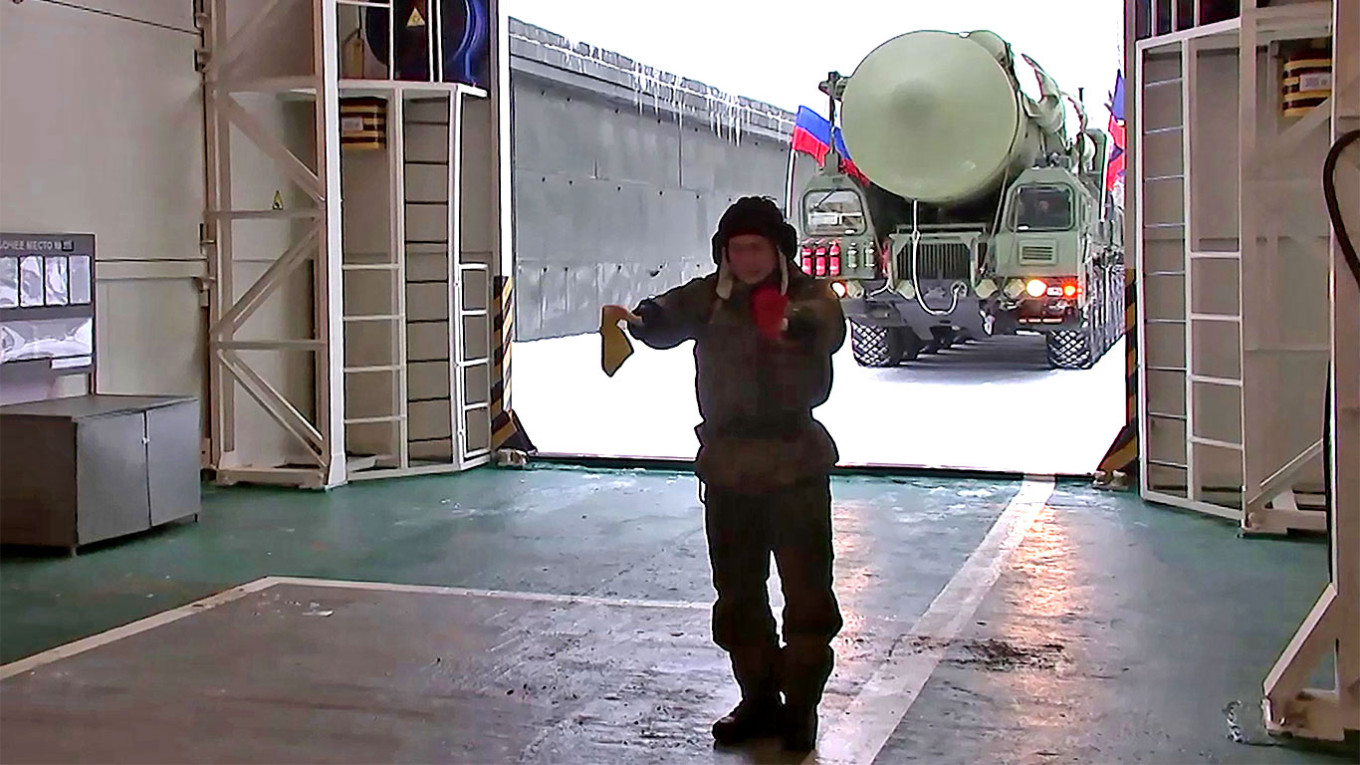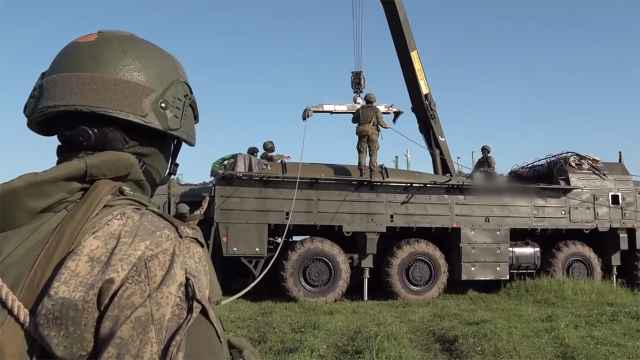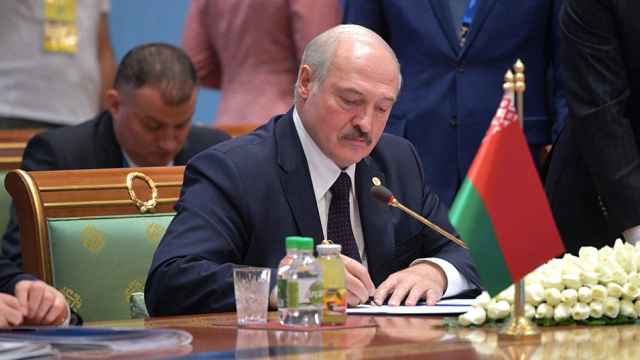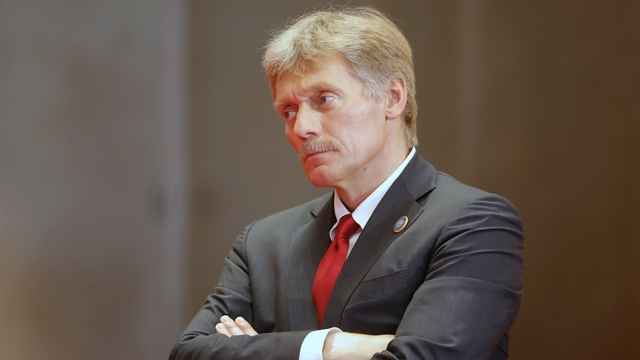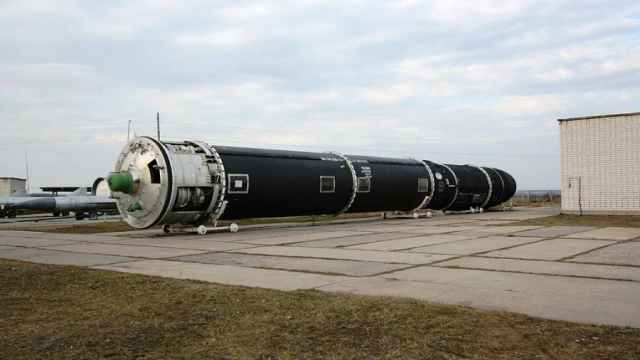Russian President Vladimir Putin’s recent announcement that Russia would station nuclear weapons in Belarus made global headlines, but in many ways, it was entirely predictable. Moscow is escalating the conflict at a time when other efforts to convince the West to stop increasing its military aid to Ukraine have failed. After all, Western leaders have no choice but to take the nuclear threat seriously.
In addition, Russia is presenting the deployment not just as a decision made by both countries, but as a response to long-standing requests by Belarusian leader Alexander Lukashenko. This is Russia’s tried-and-tested way of showing respect for its ally, previously cited when dispatching Russian troops to Belarus for training exercises both last February — ahead of the invasion — and in October.
It’s not yet clear when Russian weapons could appear in Belarus. Putin said only that starting in April, Belarusian pilots will receive training in piloting planes capable of carrying nuclear weapons, and that a nuclear weapons storage facility would be built in Belarus by July 1. According to the Russian president, control of the weapons will not be handed over to Belarusian troops.
The lack of detail appears to confirm that the announcement's aim is to signal to Russia’s adversaries — primarily the United States — that they still have time to change trajectory and agree terms with Russia to ensure that that storage facility remains empty. If nuclear weapons in Belarus were required for military purposes, Russia would hardly have announced that publicly, in advance, and with a specific timeframe.
It's true that the Belarusian leader has been talking about the possible deployment of nuclear weapons in his country for almost 18 months now. Even before the war in Ukraine, in November 2021, he floated the idea as a possible response to the deployment of U.S. nuclear weapons in Poland.
Lukashenko could hardly have known back then that a war would soon be underway, and that a year later Putin would want to resort to nuclear blackmail. It’s more likely that Minsk was simply carrying out a traditional foreign policy exercise, offering the boldest kind of security services in expectation of potential political and economic support from Moscow.
Judging from the context in which these threats were made, Lukashenko was also craving recognition and the respect of his peers, and sees nuclear weapons capable of reaching Vilnius, Warsaw, and Kyiv as a way to achieve that.
Yet the chance to intimidate the Lithuanians and Poles will also translate into greater attention to Belarus from NATO. Belarusian nuclear weapons storage facilities, missile deployment sites, and airfields will become a primary target should the Russian-Ukrainian conflict escalate more globally.
Overall, it’s hard to say whether the idea has more advantages or disadvantages for Lukashenko himself. Ordinary Belarusians are expected to be against the move: about 80% of the country’s urban population oppose the deployment of nuclear weapons in their country, according to Chatham House surveys carried out last year.
It would clearly strengthen Belarusian ties to Russia, as the country would essentially acquire a new Russian military base. Ultimately, however, it changes little between Minsk and Moscow, as both regimes have long since passed the point at which Putin might allow an uncontrolled transfer of power in Belarus. In this context, deploying nuclear weapons gives the Kremlin another reason to leave the Belarusian military stronghold under Lukashenko’s control — but there were already plenty of reasons to do that.
Minsk will naturally demand and likely receive some kind of economic aid in return. The Ukraine war would have run a very different course without the cooperation of Belarus, and now Lukashenko is also helping Moscow with its global nuclear blackmail. It would be ungracious of the Kremlin to let such loyalty go unrewarded.
For six months, Lukashenko has avoided becoming more deeply embroiled in the conflict. There has been no shelling of Ukrainian territory from Belarus since October. But the deployment of nuclear weapons, if and when it happens, will be a major new step in Belarus’s involvement.
It will become harder for those in Europe who have advocated applying differing sanctions to Minsk and Moscow to defend their position, while hawks such as Poland and the Baltic states will have powerful new ammunition to bolster their long-held argument that Lukashenko should be treated as part of the Russian regime. Neither side is likely to take into account that it’s doubtful whether anyone actually asked Lukashenko’s opinion on the issue. He has threatened too many times in the past to ask Putin to return the nuclear weapons withdrawn from Belarus in the mid-1990s.
Brussels is already threatening Minsk with new sanctions if nuclear weapons do appear on Belarusian territory. But the most painful sanctions have long been in place, so threats from the West are far less dangerous for Lukashenko than Russia’s inevitable ire if he suddenly changes his mind.
Another consequence of the announcement is that lobbyists in the UN and from the Global South will face far greater difficulties now convincing the EU hardliners to unblock the export of Belarusian potassium fertilizer through the Lithuanian port of Klaipeda. The EU has for several months been discussing the possibility as a way to alleviate the global food crisis, but loosening sanctions against Minsk at this point would look absurd.
Finally, as long as Belarus remains no more than a corridor for Russian ground troops, their training range, and a base for Russian jets, there’s a chance that the country’s complicity in this war could stay under the radar of peace negotiators. But if Belarus acquires a full-fledged permanent Russian nuclear base, the Belarusian question will likely feature on any postwar settlement agenda.
Even if negotiations on a new European security architecture take place when Putin and Lukashenko are no longer in power, it will be hard to overlook the presence of nuclear weapons so close to Kyiv and three NATO member capitals. Now the West and Ukraine are more likely to demand the demilitarization of Belarus to at least prewar levels.
The fate of Belarus as a state is becoming increasingly tied to the outcome of a future peace settlement. It will be hard for any subsequent government in Minsk to distance itself from Russia economically and politically of its own accord. But once Belarus starts hosting Russian nuclear weapons, it will be downright impossible.
This article was originally published by the Carnegie International Endowment for Peace.
A Message from The Moscow Times:
Dear readers,
We are facing unprecedented challenges. Russia's Prosecutor General's Office has designated The Moscow Times as an "undesirable" organization, criminalizing our work and putting our staff at risk of prosecution. This follows our earlier unjust labeling as a "foreign agent."
These actions are direct attempts to silence independent journalism in Russia. The authorities claim our work "discredits the decisions of the Russian leadership." We see things differently: we strive to provide accurate, unbiased reporting on Russia.
We, the journalists of The Moscow Times, refuse to be silenced. But to continue our work, we need your help.
Your support, no matter how small, makes a world of difference. If you can, please support us monthly starting from just $2. It's quick to set up, and every contribution makes a significant impact.
By supporting The Moscow Times, you're defending open, independent journalism in the face of repression. Thank you for standing with us.
Remind me later.



